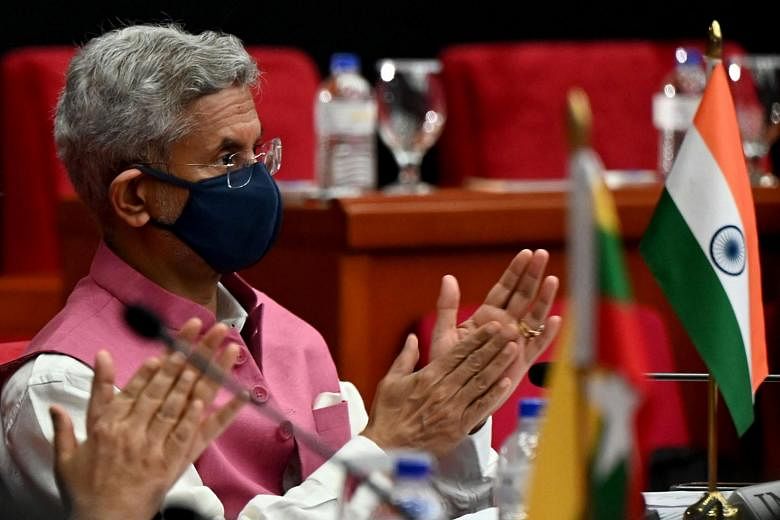NEW DELHI - Indian External Affairs Minister S. Jaishankar has gone on a trip to the Maldives and Sri Lanka aimed at reinforcing ties with the two island states and highlighting, particularly in Colombo, that New Delhi was a friend that could be counted upon in time of need, according to Indian analysts.
Dr Jaishankar, who arrived in Colombo on Tuesday (March 29) for a two-day visit, has met top Sri Lankan leaders including President Gotabaya Rajapaksa, who, in a tweet, thanked New Delhi for its "invaluable assistance" amid the ongoing economic crisis on the island. The Indian minister also met Prime Minister Mahinda Rajapaksa, the President's brother.
India has extended US$2.5 billion (S$3.4 billion) in assistance, including currency swap and credit lines, to Sri Lanka, which is deep in debt and lacking foreign exchange to pay for imports of even essential items from food to oil.
On Tuesday, in a tweet, Dr Jaishankar expressed concern after Sri Lanka's Peradeniya Hospital announced the temporary suspension of all routine surgeries due to the shortage of medicine.
"Disturbed to see this news," he tweeted, adding that he was asking the Indian envoy to get in touch with the hospital to discuss how New Delhi could help.
He also visited a petrol pump run by Lanka IOC, a subsidiary of Indian Oil Corporation and one of the biggest fuel suppliers in Sri Lanka. Dr Jaishankar said he was briefed on the fuel situation on the island by Lanka IOC managing director Manoj Gupta.
During Dr Jaishankar's visit, India and Sri Lanka have signed six agreements, which included the setting up of a hybrid solar and wind project in three islands off Jaffna on the northern tip of the island. Late last year, Colombo cancelled a similar project awarded to China following Indian opposition on security grounds that it was too close to India's Tamil Nadu state.
"We are trying to say in times of distress, we are there as a well-meaning neighbour," said Dr Ashok K. Behuria, Senior Fellow at the Manohar Parrikar Institute for Defence Studies and Analyses.
"We are basically trying to make sure that goodwill that was there towards India in the neighbourhood at the level of people and the level of government stays at a positive level."
He noted that the neighbourhood outreach was also a very important part of India's Sagar or Security and Growth for All in the Region and "Neighbourhood First" policy.
India has ramped up its outreach to Indian Ocean countries in recent years amid the growing influence of China, which has made heavy investments in South Asia. The Indian Ocean is an area that India has traditionally considered part of its backyard.
Ties with Sri Lanka as well as the Maldives have gone through some ups and downs.
But relations between New Delhi and the Rajapaksas, who during an earlier stint in power tilted towards Beijing, have improved.
"In the case of Sri Lanka, the general Indian perception was that Rajapkasas were anti-India. This is surely getting neutralised. How far it will go needs to be seen. Sri Lanka has taken the middle path between India and China for economic development. India's role (during the current crisis) is definitely noticeable and is being noticed within and outside the country. India is playing more than a stabilising role, even supplying oil despite the existing global situation," said Mr N. Sathiya Moorthy, head of the Chennai chapter of the Observer Research Foundation.
In the Maldives, a change in government has led to improved relations.
The previous Maldivian president, Mr Abdulla Yameen, was seen to have cultivated ties with China at the cost of ties with India. But the present government headed by President Ibrahim Mohamed Solih, who came to power in an election in 2018, has restored stability to the relationship with New Delhi as well as the Maldives' India First policy.
Dr Jaishankar, who was in the Maldives for a two day visit from March 28, met his counterpart Abdulla Shahid and they discussed a wide range of issues from tourism to regional and maritime security.
The Indian minister inaugurated the National College of Policing and Law Enforcement and also formally handed over a coastal radar system with 10 radar stations which were built with a US$15.8 million Indian grant.
Analysts said that India was trying to broaden its relationship with the Maldives by collaborating in different areas including eco-tourism.
"We are not only in the space of security but also in other areas of cooperation as well like education, fisheries, healthcare and even discussed gender empowerment as well as culture," said Dr Behuria.
"We are basically broad basing our interaction with the Maldives in a post-pandemic scenario when the challenges are of a magnified nature. At the moment it pays to come to each others' help."


